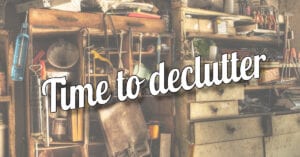Hanging on to stuff can cost your more than money
One positive outcome of the quarantine that I’ve heard clients share is that they used their at-home time to clean out basements, closets, and garages. These overdue chores resulted in higher levels of satisfaction during an otherwise trying time.
While I don’t have scientific evidence that shows improved well-being as a direct result of reducing clutter, my clients who undertook this activity during the shutdown related feeling more in control, calmer, and an improved sense of accomplishment. Another advantage of shedding unused and no longer needed items: cost savings.
Using valuable square footage in your home or garage to store and extra 20 years’ worth of stuff means a loss of usable square footage. That space can be converted to a higher value use such as for entertainment or storage of still used items that may be filling up your counters and otherwise cluttering your family’s living environment.
Storage units in the greater Racine area range in price from around $30 to more than $100 per month depending on the size of the unit. Some use these units for “overflow” of stuff and some report even forgetting what is stored in them.
Unneeded or no longer used items can be donated to a local charity such as Goodwill or the Salvation Army. A professional organizer once told me, “it may have served its useful life to you, but someone else may still have need of it.” I hold this thought in mind as my wife and I sort through our own tucked away stash of long since forgotten stuff. If you itemize, you may be eligible to take a tax deduction for your donations to qualifying organizations.
Many people report holding on to items because they may be needed at some point. Likely, they won’t be. Some want to pass along non-sentimental or non-heirloom things to their grown children who often accept them out of courtesy rather than out of need. The tip here is to involve the children in helping to select the things they might want or asking them in advance “would you like this bread maker I’ve had in the basement for ten years?” You can predict the likely answer to that one!
Left to the extreme, some people transcend hanging on to things and develop a hoarding obsession. Hoarding is listed in the Diagnostic and Statistical Manual of Mental Disorders (DSM-5). It’s considered an obsessive-compulsive disorder in which a person has a “persistent difficulty discarding or parting with possessions, regardless of their actual value.” The implications of hoarding, in addition to the mental well-being of the person suffering from the disorder, can convert to strain on the family’s financial resources as professional intervention is often required.
As seen in Racine Journal Times | Oct 4, 2020






